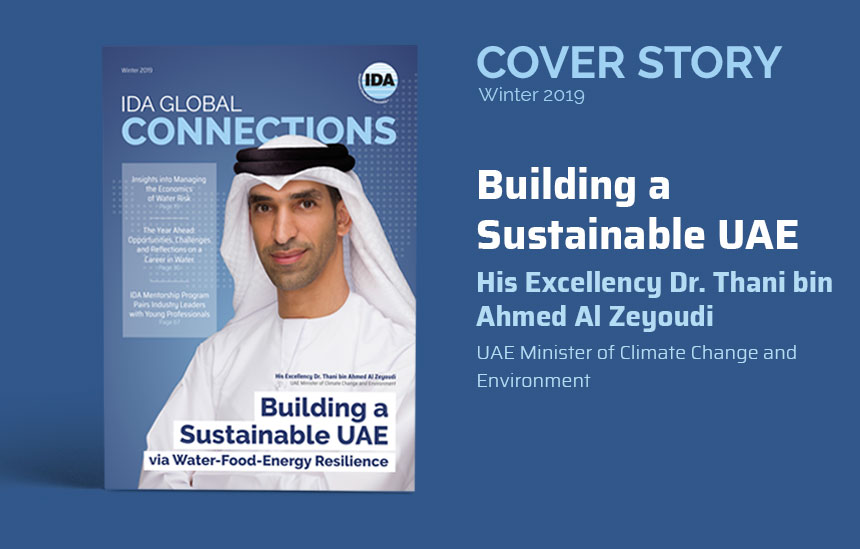Published on IDRA Global Connections Winter 2019 Issue
- By His Excellency Dr. Thani bin Ahmed Al Zeyoudi, Minister of Climate Change and Environment for the United Arab Emirates
Water, food and energy are the most essential natural resources for all life forms to survive and thrive on our planet. The demand for all three
is surging, driven by a rising global population, staggering economic boom, rapid urbanization and modern production and consumption patterns.
The reciprocal nexus between water, food and energy is overarching in the UAE. Water and energy are used to produce food, and energy is
used to produce water. However, the country’s finite water resources are casting a shadow on this symbiotic relationship, making it highly
dependent on energy-intensive desalinated water.
The agricultural sector is by far the largest consumer of the country’s limited and precious water resources. Despite this large water footprint, 90 percent of the UAE’s food is being sourced through imports.
In a bid to promote more efficient crop growth in a way that doesn’t put further pressure on the UAE’s energy and finite freshwater resources,
the country, through the Ministry of Climate Change and Environment, is spearheading the implementation of innovative technologies that support sustainable agriculture, such as hydroponics, vertical agriculture, precision irrigation, netted systems and closed-system greenhouses.
In June 2018, the Ministry revolutionized agriculture in the UAE through launching a droneenabled aerial mapping system to generate high-resolution, highly efficient aerial data, including topographic mapping, contouring, vector mapping and textured 3D city models. This data is systematically analyzed to procure accurate statistical information that supports the country’s adoption of precision agriculture. In addition, the UAE, through the work carried out by Masdar, its flagship renewable energy company, is exploring promising alternative desalination technologies – including the use of renewable energy in this field – to achieve sustainable water supply. Masdar is also developing other solutions that aim to increase sustainable crop production in the UAE’s farms while reducing overall water consumption. This will lower over dependency on seawater desalination, and thereby contribute to greater energy, water and food security in the UAE.
Furthermore, the country has introduced multiple regulations to increase resource efficiency – for example, green buildings codes that have
cut energy and water consumption by over 33 percent in new buildings, as well as appliance standards and tariff reforms to ensure efficient
use of electricity and water, particularly in urban environments that are mega consumers of these resources. The introduction of district cooling is also significant, as it lowers energy consumption by half. Thanks to these efforts, the UAE today is one of the top 10 countries outside of the
United States with the greatest number of LEED certified buildings.
The UAE is also home to some of the most innovative sustainable cities in the world. Masdar City is a blueprint for a sustainable urban community, with energy and water efficiency measures integrated into passive building design and landscape architecture. In Dubai, The Sustainable City, a primarily residential development is the first operational net-zero energy project of its kind that serves as a model for a future carbon-friendly world.
Promoting behavioral change to reduce wastage of water, food and energy by raising public awareness through media campaigns is another approach embraced by the UAE to sustain its vital natural resources.
Perhaps fittingly, the inextricable connection that exists between these critical domains requires an all-inclusive approach to ensure water and food security and sustainable energy production. Efforts here in the UAE will f eed into the wider global efforts to ultimately achieve the collective goal of a sustainable future for all

